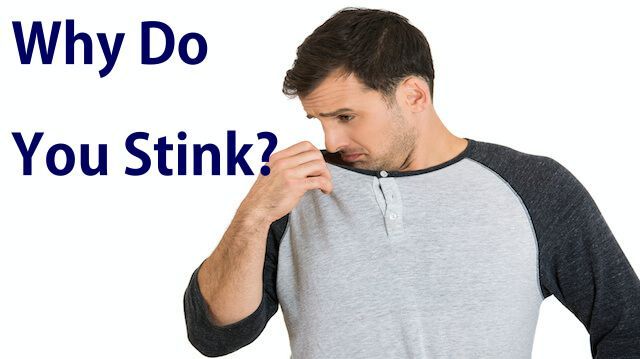
Body odor can be a really embarrassing condition. Unfortunately too many people deal with this common problem by washing more often with antibacterial soaps and body washes, and applying products that block perspiration.
While adequate personal hygiene is certainly vital for good health, applying strong commercial products to combat body odor may actually make the problem worse.
Using gentler, more natural products to ward off smelly pits is clearly a massive improvement on most deodorants and antiperspirants. However, it’s worth understanding the root cause of body odor in order to make an effort to improve the issue at the source.
Some common causes of body odor can include stress, illness and eating certain foods. Let’s examine some of the other complex biological mechanisms behind B.O.
First things first, where does sweat come from? Science tells us that there are actually two different kinds of sweat.
Regular sweat come from the eccrine glands, which are located all over the body and open directly onto the skin. If you are in hot conditions or are physically exerting yourself, your body temperature will rise. The eccrine glands are stimulated and release perspiration, which is mostly made up of water and salt. This basic type of sweat is virtually odorless and is used as a simple mechanism to cool down the body through evaporation.
The sweat that causes odor is a separate type. It comes from the apocrine glands, which are located near hair follicles. These glands are concentrated around hairy areas such as the armpits and groin. The tube of the gland is actually joined onto the hair follicle and uses the hair as a conduit to flow onto the surface of the skin. This type of sweat is essentially used as a signaling mechanism to communicate what state the body is in. In the case of hormonal fluctuations, anxiety or emotional stress, fluid made of water, proteins, fatty acids and other substances is secreted by the apocrine glands and empties into the hair follicle. This chemical mix is broken down by bacteria that live on the skin’s surface.
This breakdown process, and resulting increase in the number of bacteria, is what results in body odor. The odor can vary depending on what is going on in the body in terms of its biochemistry. The particular state of an individual body at any given time can result in many different odors. For example, propionic acid is one possible excretory product, which is associated with the smell of vinegar, while isovaleric acid is another, smelling like cheese.
Let’s examine the different factors that can influence the bacteria and sweat chemical cocktail.
Skin bacteria
All of us have billions of bacteria living all over our skin and throughout our body systems. It can be creepy to think about, but we really wouldn’t be able to survive without these little critters.
Certain strains of bacteria can contribute more to body odor than others. One of the worst offenders is Micrococcus sedentarius, which overgrows in sweaty environments and emits smelly sulfur-based compounds. Wearing shoes or non-breathable clothing can contribute to greater growth of these bacteria.
Genetic factors
Our genes also have a part to play in the production of body odor. About 10 to 15 percent of people are genetically predisposed to greater sweat production, which can naturally result in more opportunity for the overgrowth of smelly bacteria.
Another genetic condition resulting in abnormal body odor is called trimethylaminuria, affecting about 1 in every 200,000 people. This is where a person is unable to break down trimethylamine (TMA), which is a common chemical compound in the plants and animals that we eat. This results in the emission of TMA through the sweat and urine. People with this mutation can have stronger unpleasant body odor that sometimes smells like fish or ammonia. The condition fluctuates with hormone levels and may be managed through diet and nutritional supplementation.
Sleep
Sleep is an important consideration in managing body odor. As with any other change in condition that we impose on the body, getting too little sleep can trigger altered biochemistry. This can mean higher anxiety and an increased stress response, which feeds into the body odor cascade from those apocrine glands. Making sure you get adequate sleep will set you up to deal with everyday stresses more effectively and will result in less body odor.
Too little sleep also impairs the healing and repair processes that should be happening during the night. Sleep allows cells and tissues to be rebuilt and rejuvenated, and any junk the body doesn’t need is shipped out. If we don’t sleep enough, these important processes don’t happen. The body stays toxic throughout the day and hormone levels are thrown off, which sets us up for smelly sweat.
Detoxification
Most people think about the liver and the colon when they hear the word detoxification, however the skin is actually the body’s largest organ of elimination. Some experts theorize that the skin may play an important part in ridding substances that could cause the body to harbor a bad smell.
The research is conflicted with regards to how effectively sweat helps to excrete toxins from the body, but one 2011 study published in the journal Archives of Environmental and Contamination Toxicology found that “many toxic elements appeared to be preferentially excreted through sweat.”
Therefore, making sure you take time to move and exercise to get your blood flowing and to get you sweating freely is vital. Simply allow yourself to sweat without applying any antiperspirant or deodorant, and then take a quick shower afterwards to rinse off the toxic byproducts. It’s ideal if you can get your heartbeat up and work up a sweat every day. This will also promote better digestion and blood flow to the liver to promote detoxification of toxins through the blood and feces. This way there will be fewer toxins left to come out through the sweat.
Another way to promote detoxification through the skin is ayurvedic dry-brushing, where a natural bristled brush is used to stimulate the skin and lymph glands. This helps move the lymph fluid around and stimulate the glands to help remove toxins, which might otherwise contribute to worsened body odor.
Hormones
 Hormones are commonly associated with puberty and sex drive, but in fact they are the molecular messengers that control virtually every function within the human body. There are many different types of hormones which play important roles, such as controlling your digestion, immunity, fertility, sleep and healing processes, among others.
Hormones are commonly associated with puberty and sex drive, but in fact they are the molecular messengers that control virtually every function within the human body. There are many different types of hormones which play important roles, such as controlling your digestion, immunity, fertility, sleep and healing processes, among others.
The mechanisms that control the production and function of hormones are actually quite fragile, and do not stand up well to our modern environment, which is poor in nutrients and too high in toxins and stresses. It’s important to support healthy hormone balance with a conscious holistic approach to lifestyle, because an imbalance usually results in some sort of health condition.
Thyroid problems and low testosterone levels in both men and women can result in increased body odor. Many women find that their body odor changes with their monthly menstrual cycle, and may also shift with the onset of menopause, or in relation to pregnancy. These changes are normal, however, it’s important to work to stabilize hormonal production and processes by getting enough sleep and exercise and eating a nutrient-dense whole foods diet.
Dr. Joshua Zeichner, director of cosmetic and clinical research in the Department of Dermatology at the Icahn School of Medicine at Mount Sinai in New York City recommends improving the smell of the body’s secretions by consuming peppermint essential oil. The oil gets absorbed into the bloodstream and can change how sweat smells. Dr. Zeichner recommends using two drops on the tongue, three times per day. Be sure to consult a trusted practitioner before starting any new natural health regime to ensure that it makes sense for you and your personal situation.
Now that you know more about the root causes of body odor, find out more about balancing your hormones, or how to get better sleep. Using smart lifestyle practices can ameliorate many of the issues that can cause bad body odor. If you incorporate some holistic recommendations, you will be well on your way to a smell-free day.
—The Alternative Daily
Sources:
http://www.mayoclinic.org/diseases-conditions/sweating-and-body-odor/basics/causes/con-20014438
http://chemse.oxfordjournals.org/content/31/8/747.short
http://chemse.oxfordjournals.org/content/30/8/651.short
http://www.nature.com/jid/journal/v77/n5/abs/5615566a.html
http://www.mdpi.com/1424-8220/9/9/7234/htm
http://www.nature.com/jid/journal/v130/n2/abs/jid2009396a.html
http://www.medicalnewstoday.com/articles/173478.php
http://www.nlm.nih.gov/medlineplus/ency/article/003218.htm

